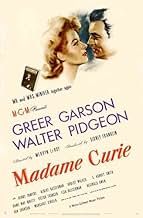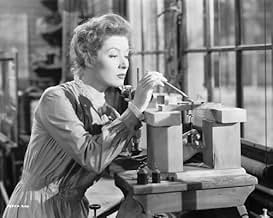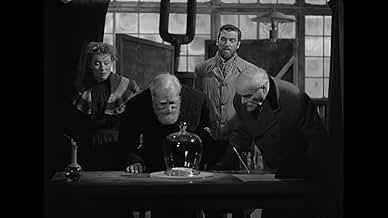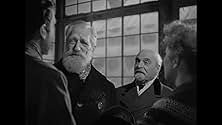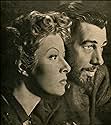Madame Curie
- 1943
- Tous publics
- 2h 4min
Ajouter une intrigue dans votre langueDespite himself, accomplished physicist and avowed bachelor Pierre Curie falls for brilliant student Marie, and together they embark on the discovery of radium.Despite himself, accomplished physicist and avowed bachelor Pierre Curie falls for brilliant student Marie, and together they embark on the discovery of radium.Despite himself, accomplished physicist and avowed bachelor Pierre Curie falls for brilliant student Marie, and together they embark on the discovery of radium.
- Réalisation
- Scénario
- Casting principal
- Nommé pour 7 Oscars
- 3 victoires et 7 nominations au total
- Madame Eugene Curie
- (as Dame May Whitty)
- Tall Woman
- (non crédité)
- Man at Accident
- (non crédité)
- Swedish Queen
- (non crédité)
- Lecturer
- (voix)
- (non crédité)
- Professor
- (non crédité)
Avis à la une
Garson and Pigeon did a nice job--give it a try.
Based upon Eve Curies book, this film follows along pretty factually the Marie Curie story leading to the couples isolating of Radium in their lab after 4 years of work. The film concentrates on the relationship that forms between Pierre & Marie & the science. The script actually allows for a nice balance there.
Greer Garson is great as Madame Marie Currie. I can't see many other actresses doing as was as she does in this role. Walter Pidgeon is excellent as Pierre & it is these 2 leads that make the film a good one. There is some quick supporting work from Van Johnson but nothing about his cameo really does a lot for this particular film.
This film does show the MGM studio quality as it existed in the 1940's as it goes over very well & is well produced. MGM came into World War 2 as the premiere studio & this film was a strong entry in the biographical film category. It is very obvious that even though the film is set in France near Paris, that Paris was not available for location filming due to the war.
This is a very good film for it's era, being factually based & really painting a positive portrait of who Marie & Pierre Curie were & why they were important in the history of science. It does give short shrift to the couples kids but at over 2 hours the film has too much to cover to do otherwise.
The movie got chilly reviews in France ,some critics going as far as to write Mrs Garson was not well cast as Madame Curie and that the movie was boring and languid.
I'm French and I do not agree with them. Even if Greer Garson does not resemble Marie Curie ,she is very convincing as the scientist ;only a small part of her life was filmed ;the movie stops with Pierre's tragic death :her second Nobel prize ,her role during WW1 ,her daughter Irene who became a great scientist too,all this is passed over in silence.After Pierre 's death,Marie had a love affair with a married man,which did not fit well into the picture of the absolutely perfect woman the screen writers wanted to show to the world.Male chauvinism,which was rampant at the time,did not spare Marie either.
This is minor quibble:the movie is good,sometimes excellent,mainly in the scenes depicting the long research in an icy ware-house.
People interested in Marie Curie should try and watch "Une Femme Honorable" ,a MTV work starring Marie -Christine Barrault ,a miniseries which covers the whole life of Madame Curie.
Their long work in the laboratories finally leads to the discovery of radium--and this is the fascinating story of how they met and married and indulged in their lifelong pursuit of discovery. A young and rather miscast Robert Walker plays a fellow lab worker. Van Johnson has a few brief moments toward the end, as does Margaret O'Brien. But the focus is on Greer Garson and Walter Pidgeon and they both deliver Oscar nominated performances.
This is one of the better screen biographies and one that has been sorely neglected over the years. Watch for my career article on GREER GARSON to appear in an upcoming issue of FILMS OF THE GOLDEN AGE.
Le saviez-vous
- AnecdotesOnly one scene in the entire film--a long shot of the Curies on honeymoon--was actually filmed outside of the studio, and even that was second unit.
- GaffesThroughout the film Marie Curie is referred to as a blonde, but Greer Garson was naturally red-headed and no attempt was made to lighten her hair to make her look blonde. Her hair photographed the dark grey common to redheads in black-and-white films of this vintage.
- Citations
[last lines]
[Madame Curie addresses a large gathering of scientists]
Marie Curie: Even now, after twenty-five years of intensive research, we feel there is a great deal still to be done. We have made many discoveries. Pierre Curie and the suggestions we have found in his notes, and his thoughts he expressed to me have helped to guide us to them. But no one of us can do much. Yet, each of us, perhaps, can catch some gleam of knowledge which, modest and insufficient of itself, may add to man's dream of truth. It is by these small candles in our darkness that we see before us, little by little, the dim outline of that great plan that shapes the universe. And I am among those who think that for this reason, science has great beauty and, with its great spiritual strength, will in time cleanse this world of its evils, its ignorance, its poverty, diseases, wars, and heartaches. Look for the clear light of truth. Look for unknown, new roads. Even when man's sight is keener far than now, divine wonder will never fail him. Every age has its own dreams. Leave, then, the dreams of yesterday. Youth, take the torch of knowledge and build the palace of the future.
- ConnexionsFeatured in MGM/UA Home Video Laserdisc Sampler (1990)
- Bandes originalesTwinkle, Twinkle, Little Star
(uncredited)
from the French melody "Ah ! vous dirai-je, Maman" (music first published 1761)
Played on piano by Linda Lee Gates and Marie Louise Gates
Meilleurs choix
Everything New on HBO Max in August
Everything New on HBO Max in August
- How long is Madame Curie?Alimenté par Alexa
Détails
- Date de sortie
- Pays d’origine
- Langue
- Aussi connu sous le nom de
- Madam Curie
- Lieux de tournage
- Société de production
- Voir plus de crédits d'entreprise sur IMDbPro
- Durée
- 2h 4min(124 min)
- Couleur
- Rapport de forme
- 1.37 : 1



